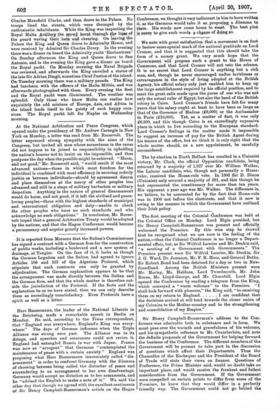At the National Arbitration and Peace Congress, which opened under
the presidency of Mr. Andrew Carnegie in New York on Monday, a letter was read from Mr. Roosevelt. The letter expressed strong sympathy with the aims of the Congress, but invited all men whose earnestness in the cause did not happen to be joined to responsibility in upholding the nation's honour not to insist on the impossible, and thus postpone the day when the possible might be achieved. "Harm, and not good," Mr. Roosevelt said, "would result if the most advanced nations—those in which most freedom for the individual is combined with most efficiency in securing orderly jpstice as between individuals—should by agreement disarm and place themselves at the mercy of other peoples less advanced and still in a stage of military barbarism or military despotism. Anything in the nature of general disarmament would do harm, and not good, if it left the civilised and peace. loving peoples—those with the highest standards of municipal and international obligation and duty—unable to check the other peoples Who have no such standards and who acknowledge no such obligations." In conclusion, Mr. Roose- velt hoped that a general Arbitration Treaty would be adopted by the nations, and that the Hague Conference would become a permanency and acquire greatly increased powers.










































 Previous page
Previous page